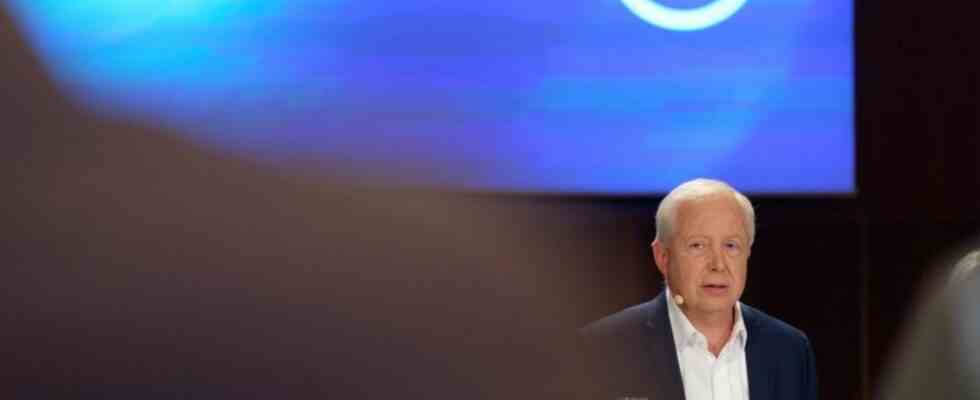media
WDR boss Buhrow for far-reaching reorganization of the broadcasting landscape
Tom Buhrow: It takes a fresh mental start. photo
© Henning Kaiser/dpa
Should ARD and ZDF stay side by side? Do you need a Germany-wide ARD radio station? Ironically, the director of the largest ARD institution asks these questions. And not only receives praise for it.
In the midst of the fierce debate about public broadcasting, ARD chairman Tom Buhrow made proposals for a far-reaching reorganization of the broadcasting landscape. “My firm impression is that Germany doesn’t seem to want us to the same extent in ten years – nor to want to finance it as it does today,” said the 64-year-old Buhrow on Wednesday evening in front of the Übersee-Club in Hamburg. The “Frankfurter Allgemeine Zeitung” (Thursday) published the speech. Buhrow is also WDR director.
Buhrow, who expressly did not speak in his capacity as the current ARD chairman, but spoke for himself, suggested key points for the reform. “Firstly, we have to break out of the previous system of state chancellery here and broadcaster there. Secondly, we need a round table to work out a new social contract. A kind of constituent assembly for our new, non-profit broadcasting.” Thirdly, there should be no taboos or bans on thinking at this round table. Buhrow also spoke of reliability and security for at least one generation.
The WDR director said with a view to the ARD joint program Das Erste and the main program of ZDF: “The first question – I think – that we have to ask ourselves is: Will Germany continue to have two nationwide, linear television channels in parallel in the 21st century ? If not, what does that mean? Should one go away entirely and the other stay? Or should they merge and keep the best of both?” The speech also dealt with the future design of the ARD regional programs and the role of orchestras, big bands and choirs. In addition, Buhrow campaigned for an open discussion about nationwide radio, which has not yet existed within the ARD.
SWR director Kai Gniffke, who will succeed Buhrow in 2023 as ARD boss, said: “I take the text as an incentive to be courageous and to make public broadcasting future-proof. Buhrow is right to challenge Netflix and Co Offer.” In order to have the resources for this, it is “right to rethink things that we have long considered untouchable, keywords radio waves, orchestras, production facilities or linear TV channels”.
At the same time, Gniffke expressed doubts about the idea of a round table. To do this, you first have to reorganize responsibility for media policy: “It can take years. I don’t have that patience. My concern is that the enthusiasm for reform will flag during this time. We should now use the momentum in ARD to work together with our supervisory boards to push bold reforms. The future media state treaty gives the necessary scope for this.”
Buhrow received praise from Federal Finance Minister Christian Lindner. He described the initiative as an important milestone. “Tom Buhrow’s initiative deserves extraordinary respect and attention,” said the FDP politician. “If we want to strengthen the legitimacy of public broadcasters again, that can only be done through reforms. There shouldn’t be any bans on thinking.” Lindner had recently attacked ARD and ZDF conspicuously often and sharply.
The ZDF expressed restraint. He does not share the “general skepticism of the ARD chairman with regard to the ability of public broadcasting to be reformed,” said ZDF director Norbert Himmler. “We are open and ready for this fundamental debate and do not shy away from any comparison of the systems,” Himmler made clear at the same time. “As a national, centrally organized broadcaster, ZDF is efficiently positioned and capable of learning and change.” ZDF has proven that successful reforms are possible.
In his speech, Buhrow, director of the largest ARD broadcaster, once again took up his idea of a single large media library in public broadcasting in 2030, which he had expressed years ago. So far, ARD and ZDF have been working together in a more networked manner, but they continue to have independent media libraries.
The WDR boss and former “Tagesthemen” moderator also addressed the topic of transmitter mergers in the ARD and referred to the history of RBB or SWR, which emerged from two stations.
In his speech, Buhrow addressed sensitive topics such as mergers, which can also be heard from politics from time to time. The federal states are responsible for media policy in Germany and describe the mandate and structure of public broadcasting in state treaties. It is not about the specific content of the program. Instead, the countries decide, for example, how many programs the broadcasters should offer or what the structure of the control bodies in the media houses should look like.
In recent years, houses have already been encouraged to save, and many jobs have been cut. Pension entitlements are financially challenging for the houses. There has also been repeated criticism of the broadcasters from politicians that they themselves do not initiate reforms decisively enough. The broadcasters, on the other hand, refer to the role of politics, which determines the scope of the broadcasters through state treaties.
Most recently, the debate about the public service was rekindled – triggered by turbulence at Rundfunk Berlin-Brandenburg (RBB) and Norddeutscher Rundfunk (NDR). There had been different allegations against management personnel. The Berlin Public Prosecutor’s Office is even investigating RBB, where allegations of nepotism are concerned. The presumption of innocence applies until clarification.
The federal states are currently reforming public service broadcasting, which is financed by broadcasting fees. Households currently pay 18.36 euros a month. The reforms are about adjusting the mandate and structure. The financing of broadcasting is to follow in a second reform step.
Speech in the “FAZ”

